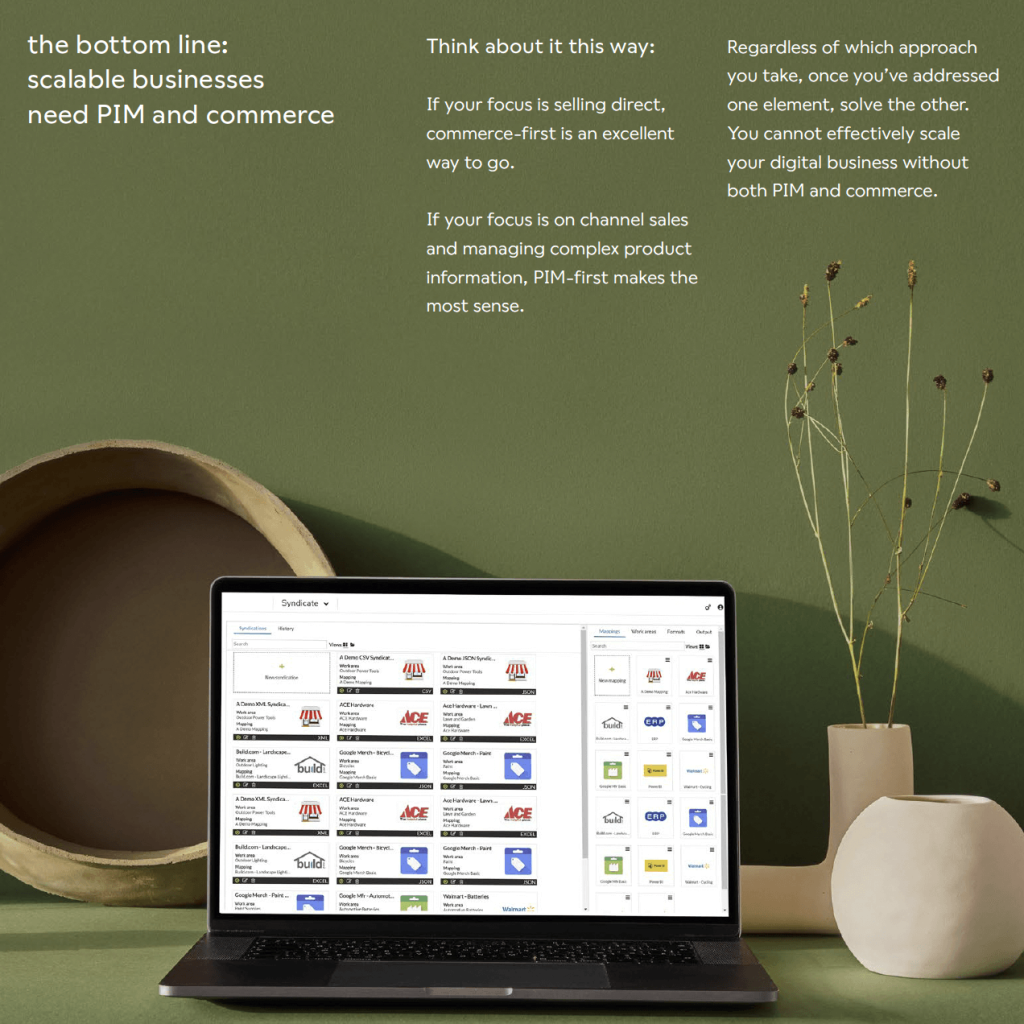Commerce is launched but your product information is a mess. Now what?
October 26, 2022It's hard to succeed with omnichannel commerce if your product content is inconsistent across channels.
If the past few years have taught manufacturers anything, the era of sales staff as gatekeepers of product information is officially over. The COVID pandemic only accelerated the trend toward self-enabled modern digital commerce.
Manufacturers without a robust digital sales presence were suddenly scrambling to get their ecommerce offerings up to speed to meet the needs of today’s sophisticated buyers. Often, that meant launching commerce without the product information infrastructure necessary to support it.
If your ecommerce launch is plagued by delays, products pulled off shelves and missed revenue goals, your product information may be to blame. Here’s why: product information is at the heart of the entire ecommerce journey. From discovering and researching products to comparing price and delivery options, your customers depend on accurate, consistent product information. It’s that simple.
A product information management (PIM) solution solves your product information challenges and lays the foundation for success across all your sales channels. It’s the key to providing the modern commerce experience your customers expect. And it streamlines your ecommerce launch, so you avoid the most common pitfalls. Is it any wonder that 67% of businesses invested in product information technology last year?
PIM ensures product information is right the first time
The quality of your product information and content has a real and measurable impact on ecommerce revenue, brand equity, and your customers’ future purchase decisions.
From a revenue perspective, roughly 30% of consumers abandon their cart due to poor product information, and 65% of returns can be attributed to incomplete or inaccurate product information.
Findability also depends on high-quality product information. If your products aren’t showing up where your customers are searching, incomplete or inaccurate product information is most likely to blame. It determines your SEO success and how and where your products appear on the digital shelf.
Wondering how much your product information could be costing your business? Try our Lost Revenue Calculator to see how content could be affecting your bottom line.
Brand equity also suffers when product information isn’t up to expectations. Retail Dive discovered that 87% of consumers would unlikely buy again from a brand that provided inaccurate or inconsistent product information. Successful commerce depends on loyal, repeat customers; brands can’t afford to lose them with poor product information.
PIM provides a single source of truth for all your product information and content, ensuring that everyone across the organization uses the same up-to-date information. Because PIM acts as a centralized hub through which all your product content flows, edits, additions, and updates are immediately reflected across all your sales channels. Customers get an accurate, consistent experience with your products no matter where they encounter them.
PIM fuels ecommerce: a necessity, not an option
According to a recent inriver B2B report, 88% of manufacturers say they are facing more competition than they did a year ago. Product information can be a major differentiator for your brand, but only if you can leverage its value as a strategic asset.
With PIM, teams can easily enrich product information with the content and data your customers need to make a purchase decision. PIM also provides the power to personalize the customer experience with guided selling features that create a frictionless path to purchase. PIM gives you granular control over the flow of product data, so customers get the right information at the right time.
PIM speeds time to market, something 99% of business decision-makers say is a priority in the current economic environment. With PIM, teams can create and store all the product information and attributes necessary to meet channel-specific requirements. Teams can move quickly to launch new products and channels while reducing the risk of pulled products due to problems with product information.
And when new market opportunities require speed and agility, PIM makes it easy to localize your product information so you can get to market in record time.
which approach is best?
In the rush to go digital, it’s understandable to think a commerce-first approach makes sense. But for manufacturers and other businesses selling primarily through dealer and distributor channels, a PIM-first approach works better. Ultimately, the order (PIM or commerce-first) comes down to business goals and prioritizing the brand’s owned commerce experience or the brand’s digital shelf via channels.
Product information powers all your ecommerce activities, and it determines where your products appear and how your customers perceive them. Every purchase decision depends on accurate, complete, and consistent product information. And it’s one of your most valuable strategic assets.
PIM unlocks the value of your product information by ensuring it’s always properly structured, up-to-date, accessible, and easily deployed throughout your commerce ecosystem.
Modern PIM solutions are at the heart of composable commerce stacks, controlling the flow of information across all your ecommerce touchpoints—chatbots, cost calculators, and VR enhancements, to name a few. PIM-first commerce is the key to a better customer experience.
The bottom line
With PIM, your business can scale quickly, adapt to changing markets, and capitalize on new opportunities when they arise. In an environment where most brands generate more than 90% of their revenue through channel and dealer networks, only PIM allows you to manage your product content at scale efficiently.
Whether you’re looking to find new efficiencies in your marketing workflows or adding new technologies to enhance your customer experience, inriver PIM can help you maximize the value of your product information and leverage it to achieve your commerce goals. Paired with the power of Shift7 Digital’s ability to transform the e-commerce experience, you’ll be set up for success. Check out our new ebook together, a manufacturer’s roadmap to modern commerce success, and learn more
authors

Amanda Marx
Vice President of Marketing at Shift7 Digital
Amanda has 15 years of experience transforming B2B online experiences from both the inside and out. Shift7, the modern digital agency for manufacturers, is revolutionizing the digital experience for manufacturers, distributors and their customers.
